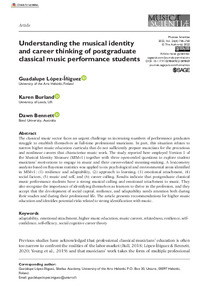Understanding the musical identity and career thinking of postgraduate classical music performance students
López-Íñiguez, Guadalupe; Burland, Karen; Bennett, Dawn (2022)
Avaa tiedosto
Lataukset:
López-Íñiguez, Guadalupe
Burland, Karen
Bennett, Dawn
SAGE
2022
2045-4147
López-Íñiguez, G., Burland, K., & Bennett, D. (2022). Understanding the musical identity and career thinking of postgraduate classical music performance students. Musicae Scientiae, 26(4), 746–760. https://doi.org/10.1177/10298649221089869
lehtiartikkeli
Julkaisun pysyvä osoite on
https://urn.fi/URN:NBN:fi-fe202301031349
https://urn.fi/URN:NBN:fi-fe202301031349
Tiivistelmä
The classical music sector faces an urgent challenge as increasing numbers of performance graduates struggle to establish themselves as full-time professional musicians. In part, this situation relates to narrow higher music education curricula that do not sufficiently prepare musicians for the precarious and nonlinear careers that characterize music work. The study reported here employed Version 1 of the Musical Identity Measure (MIMv1) together with three open-ended questions to explore student musicians’ motivations to engage in music and their career-related meaning-making. A lexicometry analysis based on Bayesian statistics was applied to six psychological and environmental areas identified in MIMv1: (1) resilience and adaptability, (2) approach to learning, (3) emotional attachment, (4) social factors, (5) music and self, and (6) career calling. Results indicate that postgraduate classical music performance students have a strong musical calling and emotional attachment to music. They also recognize the importance of identifying themselves as learners to thrive in the profession, and they accept that the development of social capital, resilience, and adaptability needs attention both during their studies and during their professional life. The article presents recommendations for higher music education and identifies potential risks related to strong identification with music.
